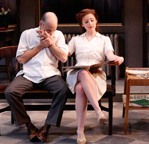 J
JJohn Tartaglia
(photo credit: T. Charles Erickson)
This amusing and astute play for solo performer by Jonathan
Tolins has had quite a remarkable journey beginning in 2013 with its limited
run at the Rattlestick Theater Off Broadway and then moving for its many-times
extended successful commercial run at the Barrow Street Theater. It closed last
summer. The play is unquestionably an enjoyable diversion as well as an essentially
show-off vehicle for a talented, personable young actor. It is currently a popular
choice for our nation's many regional theaters. Artistic Director David Saint
has cast appealing, multi-talented Tony-nominated John Tartaglia ("Avenue
Q" in which he originated the roles of Princeton and Rod) as the young,
gay out-of work actor who finds a temporary job as a shopkeeper in
entertainment icon Barbra Streisand's underground mall.
Notwithstanding the originality of the play's premise, Tartagalia's
disarmingly engaging performance is commendable on many levels, but most
notable for the way he handles Tolin's battery of chit-chat and his precise, motor-mouthed
delivery of them. Tartaglia will certainly keep many in stitches revealing what
they might have already suspected about La Streisand in Streisandland, as an obsessive
buyer as well as a compulsive custodian of her own famous and presumably
fabulous collections. These consist of clothes from her films, rare dolls, and the
innumerable tchotchkes that she has accumulated over the years, all peripheral
players including a couple of members of Streisand's staff who have their say
coming and going.
Also peripheral is an underlying motif in the play of why gay
men prefer Streisand nowadays over movie-land's other diva divine Judy Garland.
Unlike the tragic, ill-fated, born-in-a-trunk Garland, Streisand is to this day
the grandest self-perpetuating example of what a plain-looking, Brooklyn-born girl
with lots of talent and loads of chutzpah can and must do to become and stay a
star. Streisand is, as many have lovingly said about her, "a legend in her
own mind." Given her remarkable talent(s) as a singer, actress, director,
author/photographer, (check out her coffee table extravaganza "My Passion
for Design" published in 2010.) A collector non pareil, she unwittingly afforded
playwright Tolins ("The Twilight of the Golds" on Broadway and TV's
"Queer as Folk") a golden opportunity to poke fun at her well-known
and also only alluded to idiosyncrasies.
"Buyer & Cellar" has a plot that is often as
poignant as it is also paradoxically irrepressibly precious. Although he is not
an idolizing member of the Barbra cult, Alex More (Tartaglia) would rather agree to wear
what he calls his assigned "Music Man costume" in her mall than be dressed
as Mickey Mouse at Disneyland, where he last worked until he was fired. I'll
let him tell you about that. There is no costume designer credited. Tartaglia,
however, looks really cool and comfortable in the striped, hooded light-weight
sweater over a white t-shirt, gray chinos and sneakers.
There is no denying that Alex is, at first, a little
nervous, not only about working for the impossibly demanding Streisand, but
also by the very real possibility of actually meeting her. . . will she really
venture down to the subterranean "mall" below her home that she built
to house her "street of dreams" i.e. boutiques? Of course, she will.
Let's stop right here to praise the artistry of scenic
designer Andrew Boyce's setting, a triumph of minimalism, as beautifully
enhanced by Alex Koch's projection designs. While I noticed that both these
artists are acknowledged in my old Rattlestick program, I have to add that the many
different luminous glows provided by lighting designer Christopher J. Bailey
(who was not part of the original Rattlestick team) deserve a solo cheer.
Tartaglia has a tour de force with which to contend since he
not only plays Alex but also his ultra gay, if relentlessly guileless, boyfriend
Barry. But he is also right on target as the graciously condescending mistress
of the manor who suggests early on that he call her "Sadie." Don't
get me wrong, the playwright has been careful not to make a mockery of any
portion of Streisand's life. His forte are the wit-infused conversations
between she and Alex that evolve from the whimsical to the fantastical and from
downstairs to upstairs.
Thanks to Saint's crisp direction, we are quickly involved
in the development of a highly unlikely relationship, even as it ends up in a
reality that cannot be sustained for better or worse. A lot of ferocity also goes into Alex's
verbal bouts with Barry mainly over Alex's infatuation with Streisand and his
growing obsession with her mall. That you forget Tartaglia is working the room
alone is a marvel, a credit to the actor and to the playwright.
The most moving parts of the play are those in which Alex
shows his sensitivity in response to Streisand's need to indulge her own fantasies.
In the funniest scene, Alex assumes the role of proprietor of a shop with dolls
in which he refuses to bargain with her as she tries to get it for a lower the
price.
It becomes clear that Alex is fulfilling Streisand's need to
quibble and to kibitz, but not her need to be either open or real with him. She
does express her life-long desire to be beautiful in a key scene. She is also
willing to let him coach her in preparation for an audition to play Mama Rose
in a proposed film version of "Gypsy." (actually agreed upon in real
life by Streisand and its book writer Arthur Laurents.)
Interestingly, the downward spiraling of their relationship
begins when Alex accepts her invitation to go upstairs into the main house. How
their relationship sours and how Alex's severely tested one with the
contentious Barry survives provides the play with its bitter-sweet resolution. Oh,
and the handsome and very macho James Brolin (you must know who he is....and another
choice characterization for Tartaglia) ventures below during a party for a
frozen yogurt with sprinkles. That's cool and so is the play. Simon Saltzman
"Buyer & Cellar" (through March 29th)
George Street Playhouse, 9 Livingston Avenue, New Brunswick
For tickets ($28.00)- $67.00) call (732) 246 - 7717

